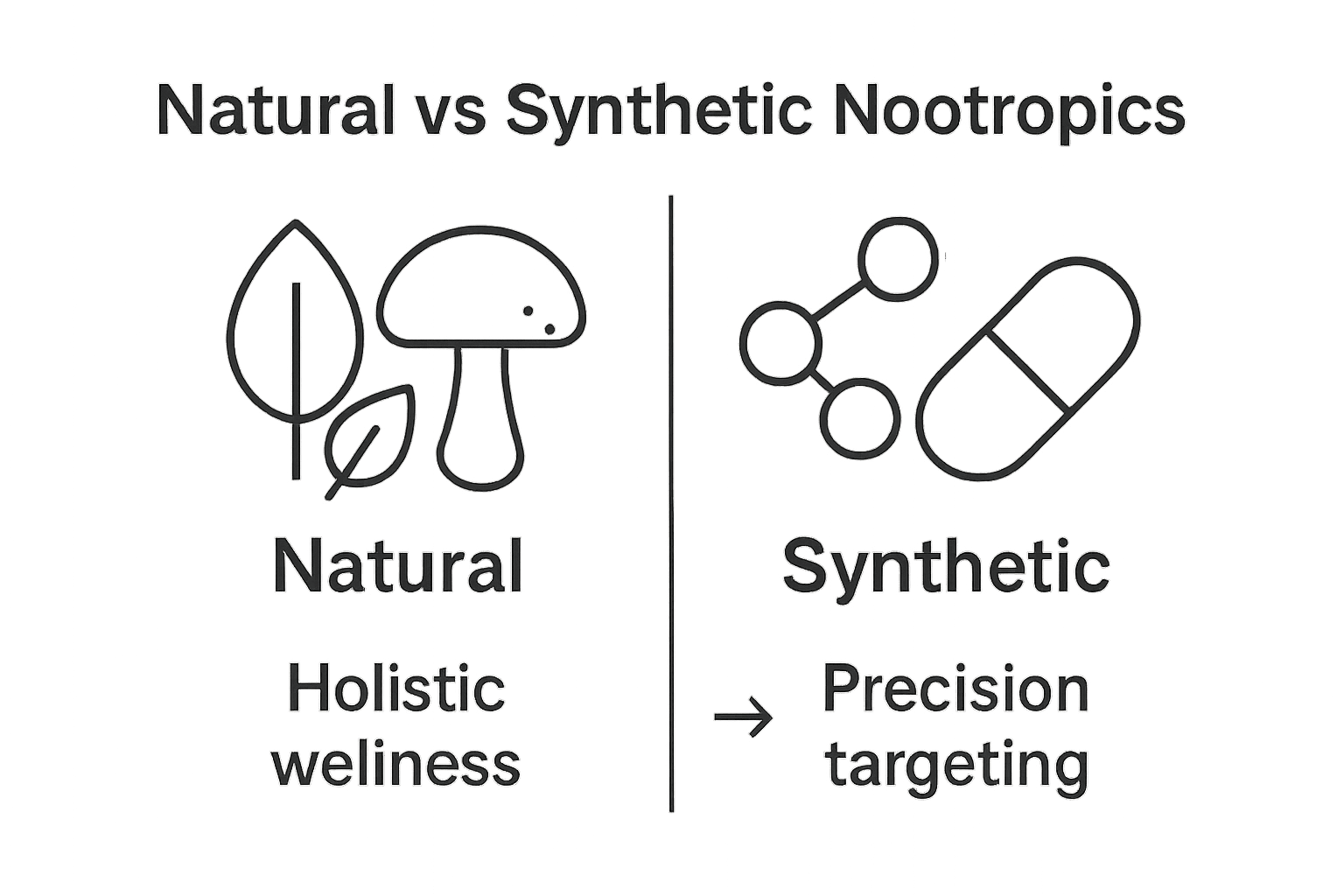Nootropics are shaking up the way people think about unlocking brain power. Some compounds can actually boost memory, focus, and creativity by interacting directly with your brain’s neurotransmitter systems. Most folks assume brain enhancement means taking risky stimulants or chugging coffee all day. But the real story is much deeper because nootropics can actually protect and even rebuild brain health over time.
Table of Contents
- The Basics Of Nootropics: Definition And Origin
- The Importance Of Nootropics For Mental Performance
- How Nootropics Work: Mechanisms And Effects
- Exploring Types Of Nootropics: Natural Vs. Synthetic
- The Role Of Nootropics In Wellness And Self-Improvement
Quick Summary
| Takeaway | Explanation |
|---|---|
| Nootropics enhance cognitive functions | They improve memory, creativity, motivation, and executive function of the brain. |
| They support brain health and resilience | Nootropics can protect against cognitive decline related to aging and stress. |
| Natural and synthetic options exist | Natural compounds come from plants, while synthetics are engineered for specific effects. |
| Enhance neurotransmitter efficiency | Nootropics increase neurotransmitter production and receptor sensitivity, improving brain communication. |
| Nootropics aid in personal development | They provide tools for improved mental performance, emotional regulation, and stress management. |
The Basics of Nootropics: Definition and Origin
Nootropics represent a fascinating class of compounds designed to enhance cognitive performance, mental clarity, and overall brain function. Originally coined by Romanian psychologist and chemist Dr. Corneliu Giurgea in the 1960s, the term “nootropics” combines Greek roots meaning “mind” and “to bend or turn,” signaling substances that can positively transform mental capabilities.
Understanding the Core Definition
At their essence, nootropics are substances that can improve cognitive functions such as memory, creativity, motivation, and executive functions. According to research from the National Institutes of Health, these compounds work by interacting with the brain’s neurotransmitter systems, enhancing neural connectivity and supporting overall brain health.
Key characteristics of genuine nootropics typically include:
- Enhancing learning and memory processes
- Protecting brain cells from chemical or physical damage
- Improving neuronal firing mechanisms
- Supporting brain metabolism and neuroplasticity
Origins and Scientific Development
The conceptual breakthrough came when Dr. Giurgea synthesized Piracetam, the first compound specifically designed to enhance cognitive function. His groundbreaking research established fundamental criteria for what constitutes a true nootropic, distinguishing these substances from traditional stimulants or pharmaceutical interventions.
Modern nootropics now span a diverse range of substances, including natural compounds like adaptogenic herbs, synthetic molecules developed in laboratories, and even certain mushroom extracts. Learn more about natural brain enhancement strategies to understand the evolving landscape of cognitive support.
Today, researchers continue exploring how these compounds can potentially support mental performance, brain health, and neurological resilience, making nootropics an exciting frontier in cognitive science and wellness research.
The Importance of Nootropics for Mental Performance
In an increasingly competitive world where cognitive performance can significantly impact personal and professional success, nootropics have emerged as a powerful tool for optimizing mental capabilities. These cognitive enhancers represent more than just a trend they are a strategic approach to supporting brain health and performance.
Cognitive Enhancement and Performance Optimization
Nootropics function by targeting specific neurological pathways to improve various aspects of mental performance. Research from the National Institutes of Health indicates that these compounds can meaningfully impact cognitive domains such as memory, attention, creativity, and executive functioning.
Key performance benefits of nootropics include:
- Improved focus and concentration
- Enhanced memory retention and recall
- Increased mental processing speed
- Better stress resilience and emotional regulation
Neurological and Psychological Impact
Beyond immediate cognitive benefits, nootropics play a crucial role in long-term brain health. They support neuroplasticity, the brain’s ability to form and reorganize synaptic connections, which is fundamental to learning, adaptation, and potential neurological recovery. Explore advanced strategies for mental creativity to understand how cognitive enhancement can transform personal and professional potential.
Moreover, these substances can help mitigate cognitive decline associated with aging, stress, and neurological conditions. By supporting neurotransmitter balance and promoting neural health, nootropics offer a proactive approach to maintaining cognitive resilience throughout different life stages.
How Nootropics Work: Mechanisms and Effects
Nootropics operate through complex neurochemical interactions that fundamentally transform brain function. These cognitive enhancers engage with the brain’s intricate systems, modulating neurotransmitters, improving neural connectivity, and supporting overall cognitive performance in sophisticated and nuanced ways.
Neurotransmitter Modulation
Research from scientific studies reveals that nootropics primarily work by influencing neurotransmitter systems. They enhance communication between neurons by increasing the availability and efficiency of critical chemical messengers like acetylcholine, dopamine, and serotonin.
Key neurotransmitter interaction mechanisms include:
- Increasing neurotransmitter production
- Enhancing receptor sensitivity
- Improving neural signal transmission
- Reducing neurochemical degradation
Neuroplasticity and Brain Energy
Beyond neurotransmitter interactions, nootropics support brain plasticity and metabolic efficiency. They help neurons form new connections, improve mitochondrial function, and optimize cerebral blood flow. Discover innovative approaches to cognitive enhancement to understand the deeper potential of these compounds.
These substances can increase brain energy metabolism, provide neuroprotective effects, and support the brain’s ability to adapt and learn.
This table outlines the main mechanisms by which nootropics influence brain function, summarizing how they interact with neurochemistry to support cognitive performance.
| Mechanism | Description |
|---|---|
| Neurotransmitter Production | Increases synthesis of key brain chemicals |
| Receptor Sensitivity Enhancement | Makes neurons more responsive to signals |
| Neural Signal Transmission | Improves communication speed between brain cells |
| Reduced Neurochemical Degradation | Prevents breakdown of neurotransmitters, preserving function |
| Brain Plasticity Support | Encourages formation of new neural connections |
| Brain Energy Metabolism | Optimizes mitochondrial function and cerebral blood flow |
Exploring Types of Nootropics: Natural vs. Synthetic
Nootropics represent a diverse landscape of cognitive enhancers, encompassing both natural botanical compounds and sophisticated synthetic formulations. Understanding the nuanced differences between these two categories helps individuals make informed decisions about cognitive enhancement strategies.
Natural Nootropics: Botanical Intelligence
Research from the National Institutes of Health highlights natural nootropics as plant-derived substances with remarkable cognitive support properties. These botanically sourced compounds offer holistic brain support through centuries of traditional medicinal use.
Key natural nootropic sources include:
- Adaptogenic herbs like Rhodiola rosea
- Mushroom extracts such as Lion’s Mane
- Herbal compounds like Bacopa monnieri
- Traditional plant medicines from global healing traditions
Synthetic Nootropics: Precision Engineering
Synthetic nootropics represent scientifically engineered molecules designed with specific neurological interactions in mind. These compounds are typically developed in laboratories, offering precise molecular structures targeting particular cognitive functions. Explore advanced cognitive enhancement techniques to understand the potential of these engineered compounds.
While synthetic nootropics can offer more targeted interventions, they often require more careful dosage management and might have more pronounced potential side effects compared to their natural counterparts.
To help clarify the differences between natural and synthetic nootropics, the table below compares their sources, characteristics, and potential considerations for users.
| Type | Source | Key Characteristics | Considerations |
|---|---|---|---|
| Natural Nootropics | Plant-derived (herbs, mushrooms) | Holistic brain support, traditional medicinal use | Gradual onset, fewer side effects |
| Synthetic Nootropics | Laboratory-engineered molecules | Precisely targeted effects, specific brain pathways | Faster action, dosage management |
| May have pronounced side effects |

The Role of Nootropics in Wellness and Self-Improvement
Nootropics represent a sophisticated approach to personal development, offering individuals a scientifically informed pathway to enhancing mental performance and overall wellness. These cognitive enhancers have emerged as powerful tools for individuals seeking intentional self-improvement and peak mental functioning.
Holistic Mental Performance
Research from medical studies reveals that nootropics contribute to holistic wellness by supporting multiple dimensions of cognitive and emotional functioning. They go beyond simple stimulation, targeting deeper neurological processes that influence mental clarity, emotional resilience, and personal effectiveness.
Key wellness dimensions supported by nootropics include:
- Enhanced cognitive flexibility
- Improved stress management capabilities
- Greater emotional regulation
- Increased mental endurance and motivation
Personal Development Framework
Nootropics offer a strategic approach to self-improvement by providing targeted neurological support. They enable individuals to optimize mental resources, manage cognitive challenges more effectively, and unlock potential through enhanced brain performance. Discover comprehensive brain enhancement strategies to understand how these compounds can transform personal development.
Ultimately, nootropics represent more than just a supplement category they embody a proactive philosophy of continuous mental optimization. By supporting neurological health and cognitive potential, these substances provide individuals with innovative tools for personal growth, professional excellence, and overall life performance.

Ready to Experience Sharper Focus and Lasting Clarity?
If you have been searching for trustworthy ways to improve memory, creativity, or daily focus, the science-backed world of nootropics speaks directly to your needs. The article above explains how real cognitive enhancements come from safe, effective compounds and highlights the specific benefits of improved mental energy, better mood, and brain health. Yet so many people still struggle to find solutions that are both gentle and truly effective.

Discover the next step in cognitive wellness by exploring Kind Stranger’s microdosed psilocybin options. Our capsules and gummies are crafted for wellness-focused individuals who want to boost creativity, sustain emotional balance, and protect their brain over the long haul. Each formula follows harm-reduction and safety principles, with dedicated resources on dosing protocols and practical guidance. Embrace the advantages of plant-based nootropics today. See what natural brain enhancement really feels like at Kind Stranger and take a step toward clearer, more focused days right now.
Frequently Asked Questions
What are nootropics?
Nootropics are substances designed to enhance cognitive performance, including memory, creativity, and executive function. They are often referred to as cognitive enhancers or smart drugs.
How do nootropics work in the brain?
Nootropics primarily work by interacting with neurotransmitter systems, improving neural connectivity, and supporting brain health. They can increase neurotransmitter production and improve signal transmission between neurons.
What is the difference between natural and synthetic nootropics?
Natural nootropics are plant-derived substances, such as adaptogenic herbs and mushroom extracts, while synthetic nootropics are scientifically engineered compounds designed for specific neurological effects. Natural nootropics often have fewer side effects but may work more gradually compared to synthetic ones.
Can nootropics help with cognitive decline?
Yes, nootropics can support long-term brain health by promoting neuroplasticity, protecting against neurochemical degradation, and potentially mitigating cognitive decline associated with aging and stress.


Comments
There are no comments yet.